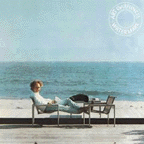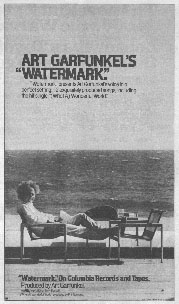![]()
  |

Watermark
Art Garfunkel
Columbia JC 34975
Released: October 1977
Chart Peak: #19
Weeks Charted: 16
Certified Gold: 3/2/78

 I first heard Art Garfunkel's third and best solo LP in the living room of the man who wrote ten of its twelve songs. Almost apologetically, Jimmy Webb introduced Watermark as "highly esoteric" before slyly venturing that he considered it a "major work." Well, the encouraging sales figures would seem to indicate that the album isn't as limited in appeal as Webb may have feared. And that's good, because Watermark contains some very worthy pop music.
I first heard Art Garfunkel's third and best solo LP in the living room of the man who wrote ten of its twelve songs. Almost apologetically, Jimmy Webb introduced Watermark as "highly esoteric" before slyly venturing that he considered it a "major work." Well, the encouraging sales figures would seem to indicate that the album isn't as limited in appeal as Webb may have feared. And that's good, because Watermark contains some very worthy pop music.
Garfunkel, a longtime admirer of Webb's oeuvre (his 1973 hit, "All I Know," was written by Webb), tapped his extensive collection of the songwriter's demos for material. Several of these songs date back to Webb's late-Sixties, goldmine days, and Garfunkel's commitment to them shines through in both his singing and his intelligent production. Watermark is at once creamily thick and as light as a soufflé.
 Click image for larger view. |
- Rich Wiseman, Rolling Stone, 5-18-78.
Bonus Reviews!
As Stanley found Livingstone, as Merman found Porter, as Warwicke found Bacharach, so Art Garfunkel has, happily, found Jimmy Webb, for his new album, Watermark, may well turn out to be a watershed in Webb's career. In it, with Webb himself hovering about on keyboards, Art Garfunkel sings eleven Jimmy Webb songs better than anyone else has so far. Garfunkel has exactly the right spare, intelligent vocal style for Webb's intense, deeply felt lyrics and the nonchalant but enormously secure musicianship the elusive music demands. In song after song Art Garfunkel brings to performing completion the work of one of America's best writers of popular music.
If there is a single high point in the album it is probably Garfunkel's performance of Webb's 1972 song "Mr. Shuck 'n' Jive," in which the acid of the lyrics etches a portrait of an angry loser. Typical of Webb and his ability to zap you slyly when you least expect it are the lines "If you can get yourself together, kindly write a criticism of this song./ How it's exquisitely constructed, yet mechanical and somehow slightly wrong./ Put it in your book about the enemy you never met." Of course this shaft is directed at "Mr. Shuck 'n' Jive" -- or is it? It is perhaps aimed at the all-too-comfortable listener who was beginning to feel pretty good about his own superiority? Garfunkel manages to infuse these lyrics with a generous compassion that makes sense of, and gives heart to, the final lines, "You know, you just might make it yet, Mr. Shuck 'n' Jive."
Another fine job is done on "Crying in My Sleep," in which Garfunkel creates the fluorescent-light-burning-at-three-o'clock-in-the-morning atmosphere of emptiness and futility, all that is left of a burned-out love affair. But it is the fusion of the two major talents, Garfunkel and Webb, in everything that is done here that gives the album its glow. "All My Love's Laughter" and "Watermark," two songs now a decade old seem to be fresher than anything I've heard all year, and for these alone Garfunkel would deserve a large measure of our gratitude.
So, hurray for everybody -- Garfunkel, Webb, and, most of all, the listener. Watermark is a truly distinguished effort [ignore if you can one puerile, non-Webb trifle from 1959 titled "(What a) Wonderful World," sung for much, much more than it's worth by Garfunkel, Paul Simon and James Taylor] and an album of which everyone involved can be enormously proud. Quality this high is hardly typical of the pop scene, so I suggest that you grab it at once for your permanent collection.
- Peter Reilly, Stereo Review, 5/78.
This album has been in the works for more than a year, and the result justifies the time. The album is sort of a tribute to songwriter Jimmy Webb as 10 of the songs were penned by him. The orchestration is as extensive as the Muscle Shoals Rhythm Section, the Chieftains, David Crosby, Stephen Bishop, Webb (on keyboards), and the host of other first-rate talent who help out. A highlight is a crafty version of Sam Cook's "(What A) Wonderful World" as Paul Simon and James Taylor add vocals. Best cuts: "(What A) Wonderful World," "Crying In My Sleep," "Saturday Suit," "Mr. Shuck 'N' Jive."
- Billboard, 1978.
The original idea was for Art Garfunkel to record an album of songs written by Jimmy Webb. But when the lead-off single, "Crying in My Sleep," failed to make the charts, Columbia Records withdrew the album and induced Garfunkel to put together a cover of Sam Cooke's "(What A) Wonderful World" with Paul Simon and James Taylor harmonizing. The single and a revised version of the LP then made the Top 40. But it's still a Garfunkel-Sings-Webb album, except for one song. And the initial idea was a good one: Garfunkel handles Webb's wistful pop songs well, and he has made good choices from Webb's songbook, dating back to the 1960s, though avoiding his big bits. The result is Garfunkel's most cohesive solo album. (The original version of Watermark, on test pressings and only a very few commercial copies, was available briefly in October 1977. The revised version, containing "[What A] Wonderful World," was released in January 1978.) * * *
- William Ruhlmann, The All-Music Guide to Rock, 1995.
Watermark is a worthy collaboration with writer Jimmy Webb. * * *
- Leland Rucker, Musichound Rock: The Essential Album Guide, 1996.
![]() Reader's Comments
Reader's Comments
No comments so far, be the first to comment.